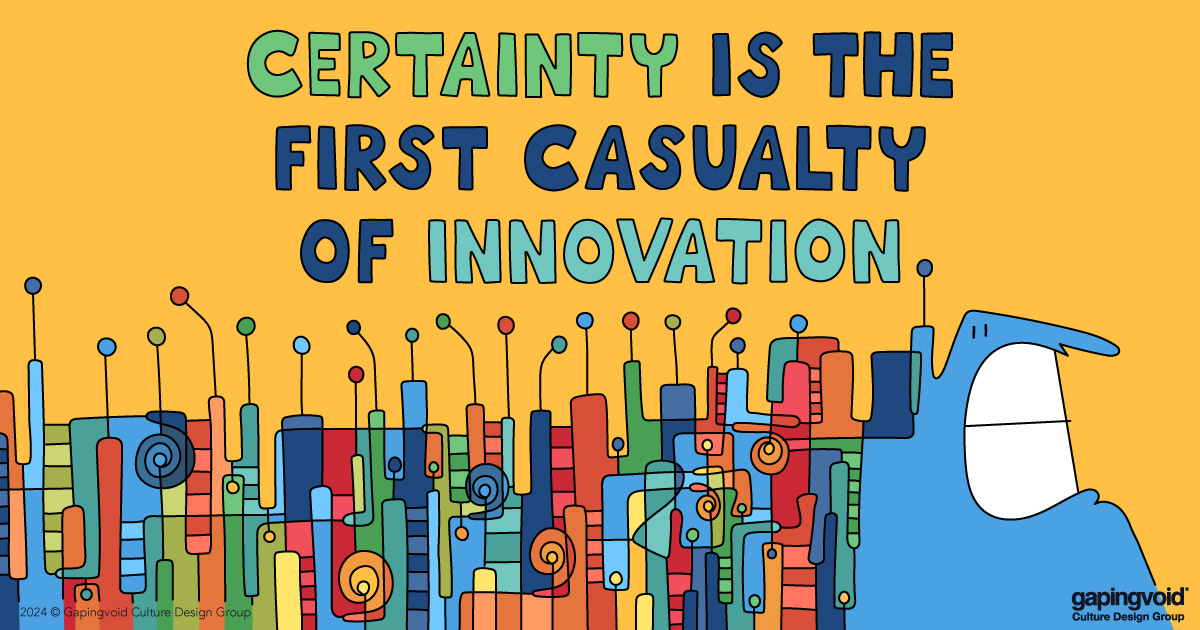Redundancy as Reality
And on becoming a turtle rather than a frog.....

Somewhere in the conversations I have been having with those who find themselves displaced, either by choice or circumstance, from what they have become accustomed to, an insight has emerged:
When we work with others on their terms, redundancy is inevitable
For the vast majority of us, working for others is a practical reality for part, or perhaps all, of our working lives. Whether it is an immediate need for income to survive, the acquisition of particular skills, or sometimes through force as slaves, we are brought together with those on whose terms we work at a point of mutual but asymmetric choice. Our needs are met by accepting their control, even as we tell ourselves a different, more emollient story.
It puts us on a path that we know will diverge at some point when we go our separate ways. The reality is that when that happens, it is a choice either of us can make, but too often, the illusion we have that the relationship is more than temporary lulls us into a false sense of security.
It is a point in time when the power, poetry, and opportunity of Kairos time intersect with the metronomic inevitability of Chronos's time. Kairos denotes the moment in which the shuttle could be passed through threads on the loom, a moment of flow and natural timing. Chronos is quantitative; kairos has a qualitative, rhythmic, permanent nature.
Until technology-enabled globalisation cohabited with the drive for perpetual growth to vaporise the connection between work, location and community, the separation was more often accompanied by economic failure or the iconic retirement gold watch than short-term expediency and a text message.
Separation now is often remote, brutal, and lonely. Chronos rather than kairos. People find themselves discombobulated as dislocation is triggered by spreadsheets and algorithms, where there is no place for the emotional connections that go with work. It’s a shame; it’s rarely personal, but it is inevitable. Working for others is not a vocation; it’s part power relationship and part culture.
A scorpion wants to cross a river but cannot swim, so it asks a frog to carry it across. The frog hesitates, afraid that the scorpion might sting it, but the scorpion promises not to, pointing out that it would drown if it killed the frog in the middle of the river. The frog considers this argument sensible and agrees to transport the scorpion. Midway across the river, the scorpion stings the frog anyway, dooming them both. The dying frog asks the scorpion why it stung despite knowing the consequence, to which the scorpion replies: "I am sorry, but I couldn't resist the urge. It's my character."
Often attributed to Aesop, but not found in his writings
This begs the question of why we are not more prepared for it. As uncertainty increases, redundancy moves from the realms of risk measured in probabilities to one of the milestones along the path of our lives that we need to factor into our personal strategies.
Perhaps the most insidious element of our executive work culture is that it absorbs all our time while using only a fraction of our capabilities and talent. To adapt Sir Ken Robinson’s line on creativity, substituting employment culture for education:
Employment culture mines our minds in the way we strip-mine the earth for a particular commodity. And for the future, it won’t serve us.
Do Schools Kill Creativity? Sir Ken Robinson
It may feel toxic, but it’s not personal. Being ready to leave is important for the health of the business and for our own well-being. Dependency is miserable. Investors require returns based on Chronos time rather than kairos and must be linear, constantly increasing, and predictable, which makes strip mining for productivity and efficiency necessary.
So much for the reality; what are our options? There is an earlier Persian version of Aesop’s fable that offers a clue:
In The Scorpion and the Turtle, it is a turtle that carries the scorpion across the river, and the turtle survives the scorpion's sting thanks to its protective shell. The scorpion explains to the baffled turtle that it could not resist its instinct to sting and knew that its stinger would not pierce the turtle's shell. The turtle then passes judgment on the scorpion. In Kashefi's version, the turtle judges the scorpion to be a "base character" and reproaches itself for not having better character judgment. In Jami's version of the tale, the turtle judges the scorpion to be a "wicked fellow" and drowns the scorpion to prevent it from harming anyone else.
We need a protective shell. For a very few, the idea of creating that through earned wealth becomes real, but it is only a few. We harbour dreams of becoming entrepreneurs, hatching and realising a brilliant idea. Again, very few and those shells are expensive in terms of our broader life, leaving little time for the joy of living.
The most durable shells are those created by community. They are spaces where we are recognised for who we are and what we bring as people, where we can have conversations that matter rather than the “Stockholm syndrome” discussions in the meeting room, anchored in the Chronos time of performance. They are places where uncertainty can be held and examined without fear and seen for what it is, a signal for change.
Most separations are preceded by a period of quiet. We know it is coming, if not when, and often when we are busy being busy we put it aside to be dealt with later. And then, inevitably, it arrives, and we are not ready.
We need to be ready. Readiness is the shell, and readiness is to be found in conversations that matter, in the company of those we trust. They cannot be bought in the market because they require personal investment in listening to others even as they are listening to us. Separation from those who pay us for our time is inevitable, and we need to use that funded time to have the conversations in order to be ready for when it ends.
Over at Outside the Walls, we are creating spaces to catalyze, nurture, and connect conversations that matter. There are no goals or objectives, just a place to hold uncertainty ready for when its source makes itself known and see it as opportunity rather than threat.
Whether you’ve suddenly found yourself outside the walls, feel it coming, or are going to go through the gates of your own accord, the more voices and ears we have, the better we can work together to be turtles rather than frogs…
P.S. There’s a great post this week over at Gaping Void about certainty.



This came into my inbox this morning and resonated:
"It has been a curious feature of democratic thought that it has not faced up to the private corporation as a peculiar organization in an ostensible democracy. Enormously large, rich in resources, the big corporations, we have seen, command more resources than do most government units. They can also, over a broad range, insist that government meet their demands, even if these demands run counter to those of citizens expressed through their polyarchal [rule by the many] controls. Moreover, they do not disqualify themselves from playing the partisan role of a citizen — for the corporation is legally a person. And they exercise unusual veto powers. They are on all these counts disproportionately powerful, we have seen. The large private corporation fits oddly into democratic theory and vision. Indeed, it does not fit."
| Charles Lindblom, Politics and Markets: The World’s Political-Economic Systems
Source: https://open.substack.com/pub/workfutures/p/it-does-not-fit?r=4xbtf&utm_campaign=post&utm_medium=email
Love the line “work culture absorbs all our time and only a fraction of our talents”. A good life surely needs the reverse of this. A chance to express our full capability and the time to do this in an unhurried way so that we enjoy the journey.